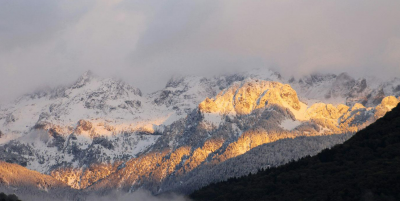Science
Scientists Explore French Alps in Search of Elusive Dark Matter

Researchers are delving deep beneath the French Alps to uncover the secrets of dark matter, a mysterious substance that remains undetectable through direct observation. Instead, scientists infer its existence by studying its gravitational effects, which play a crucial role in the universe’s structure. By binding galaxy clusters together and influencing the motion of stars within galaxies, dark matter represents one of the most significant puzzles in modern astrophysics.
The initiative, which began in September 2023, involves a collaboration between several prestigious institutions, including the European Organization for Nuclear Research (CERN) and the University of California, Berkeley. The scientists aim to enhance their understanding of dark matter’s properties and its role in the cosmos.
Understanding Dark Matter’s Impact
Dark matter constitutes approximately 27% of the universe, yet remains largely elusive. Its gravitational effects are observable, as they provide the necessary force that keeps galaxies intact. For instance, stars within galaxies move at speeds that suggest there is more mass present than what is visible. This discrepancy leads researchers to conclude that an unseen mass—dark matter—must be present.
Utilizing advanced technologies, the team in the French Alps seeks to capture and analyze the faint signals that dark matter might emit. One of the techniques employed is gravitational lensing, where light from distant stars bends around massive objects, revealing the presence of dark matter.
This project not only aims to explore dark matter’s properties but also to address fundamental questions regarding the universe’s formation and evolution. According to Dr. Lisa Randall, a physicist at Harvard University, “Understanding dark matter is essential for grasping the full picture of how our universe functions.”
Future Implications and Research Directions
The research conducted in the French Alps could have far-reaching implications for both theoretical and experimental physics. By gaining insights into dark matter, scientists hope to refine existing models of cosmic evolution and enhance our understanding of fundamental forces at play in the universe.
The findings from this project may eventually contribute to the development of new technologies and methods for exploring the cosmos. As Dr. Randall notes, “Every discovery in this field opens doors to new questions and possibilities.”
As the team continues its work, the scientific community eagerly anticipates the findings that may emerge from this groundbreaking investigation. The quest for dark matter not only represents a challenge for physicists but also stands as a testament to humanity’s enduring curiosity about the universe and our place within it.
-

 Technology5 months ago
Technology5 months agoDiscover the Top 10 Calorie Counting Apps of 2025
-

 Health2 months ago
Health2 months agoBella Hadid Shares Health Update After Treatment for Lyme Disease
-

 Health3 months ago
Health3 months agoErin Bates Shares Recovery Update Following Sepsis Complications
-

 Technology4 months ago
Technology4 months agoDiscover How to Reverse Image Search Using ChatGPT Effortlessly
-

 Technology1 month ago
Technology1 month agoDiscover 2025’s Top GPUs for Exceptional 4K Gaming Performance
-

 Technology2 months ago
Technology2 months agoElectric Moto Influencer Surronster Arrested in Tijuana
-

 Technology5 months ago
Technology5 months agoMeta Initiates $60B AI Data Center Expansion, Starting in Ohio
-

 Technology5 months ago
Technology5 months agoRecovering a Suspended TikTok Account: A Step-by-Step Guide
-

 Health4 months ago
Health4 months agoTested: Rab Firewall Mountain Jacket Survives Harsh Conditions
-

 Lifestyle5 months ago
Lifestyle5 months agoBelton Family Reunites After Daughter Survives Hill Country Floods
-

 Technology4 months ago
Technology4 months agoHarmonic Launches AI Chatbot App to Transform Mathematical Reasoning
-

 Technology3 months ago
Technology3 months agoUncovering the Top Five Most Challenging Motorcycles to Ride



















